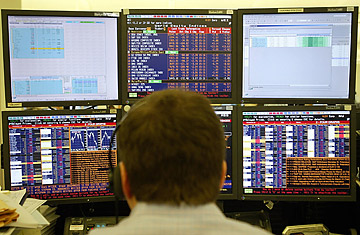
An analyst works on the trading floor at Goldman Sachs
(2 of 2)
Top Wall Street money manager Jeremy Grantham recently wrote shareholders that he thought the Volcker rule would eliminate conflicts of interest at financial firms. Citigroup's current chief executive Vikram Pandit, too, has said he believes banks need to start curtailing their riskier activities. In November, speaking to business students at Washington University in St. Louis, Mo., Pandit said that unlike with other financial crises, proprietary trading played a much bigger role than underwriting in the recent credit crunch that nearly brought down his firm. "It makes sense to me that you don't take deposits as an institution and turn around and run a hedge fund," he told students.
Skeptics say it will be very hard to define which trades are being made on behalf of the firm and which are being made for clients. At issue as well is which firms would be subject to the Volcker rule. The skeptics say the Volcker rule wouldn't have stopped the collapse of Lehman or another investment bank, Bear Stearns, because they were not traditional banks. (Administration officials say the proposed rule would apply to any firm that owns a bank with federally insured deposits, which Lehman and Bear both did.) What's more, critics say, if you were to limit financial firms to just making loans and buying low-risk securities, you would curtail profits and run many firms out of business. With fewer financial firms, other corporations might have to pay higher fees to raise money.
"If companies can't sell stock or bonds as easily as investors would like to buy them, the cost of capital will go up," says James Ellman, president of the money-management firm Seacliff Capital. "That hurts companies' ability to expand, buy equipment and create jobs. GDP grows slower."
A number of financial firms, including Citigroup, JPMorgan and Morgan Stanley, say they have already exited proprietary trading, or at least limited their activities in that area dramatically. Goldman Sachs says proprietary trading makes up less than 10% of the firm's revenue. But many observers say the trading these firms do for their own accounts is much larger than they let on.
The problem is that Wall Street and Washington appear to have very different definitions of what is proprietary trading. Goldman and others are defining proprietary trading as the day-to-day money these firms risk in the markets, buying and selling stocks and bonds. Volcker seems to want to limit not just this trading but also the big long-term bets banks make on real estate, mortgages and other securities.
Indeed, it was these so-called principal investments that did in Lehman Brothers. In 2006, Lehman Brothers generated 58% of its revenue from proprietary transactions, up from 33% in 1998. In 1998, Lehman held just $28 billion in securities and other financial instruments. By 2007, at the beginning of the financial crisis, Lehman's holdings of these investments had increased more than tenfold, to $313 billion, up nearly $100 billion from the previous year alone.
"Continuing to let the market participants mix agency activity with prop trading is like letting my aunt Agnes play center in Sunday's Super Bowl game," says Elvin Riley, a professor who specialized in securities trading at Seton Hall University's Stillman School of Business. "There is no regulation against it, and the ratings might go up, but it is such a bad idea."
